For both businesses and customers alike, there are a lot of logistical uncertainties out there with the aggressive spread of coronavirus (or COVID-19).
Knowing what to do to help slow the spread while still operating in the economy is like threading a needle. Our knuckles are cracked from excessive hand washing while trying to handle incoming mail seems like a job for the hazmat team.
We need to buy (and sell) lotion for our dried out hands. We need online retail therapy to help us get through this extreme isolation.
All the sweatpants, blankets, books about Hygge, wine, and bath bombs you’ve got, please!
So, in the spirit of simplifying your shipping (and receiving) rituals, we’re going to answer some questions and give some insight on what other small businesses are doing to stay safe.
How long does coronavirus live on surfaces?

It depends on the surface. A recent study suggests that the virus that causes COVID-19 can live in aerosols and on various surfaces for anywhere from 3 hours to 3 days.
Here is how long it can live by environment:
- In the air (aerosolized form) - up to 3 hours
- On cardboard (or other porous surfaces) - up to 24 hours
- On plastic or stainless steel (or other hard, shiny surfaces) - up to 72 hours
As most packages are shipped in cardboard boxes, we're already off to a great start. Plus, before it made it to its destination, it had already traveled for some time through a variety of temps and locales.
To be on the careful side, leaving a box outside for a day could do some good to avoid infection. Unless you need what's inside urgently.
Right off the bat, you’ve learned something that can help you and your customers. Knowing this can inform your communications to customers to help them stay calm and safe.
That being said, if you’ve touched a surface that you suspect is covered in the coronavirus then you should regard your hands as contaminated.
Don’t touch your face and wash your hands as soon as you can for at least 20 seconds. Sing the happy birthday song to make it fun!
You don’t think about it, but you touch your face all the time.
What precautions should customers take when receiving packages?
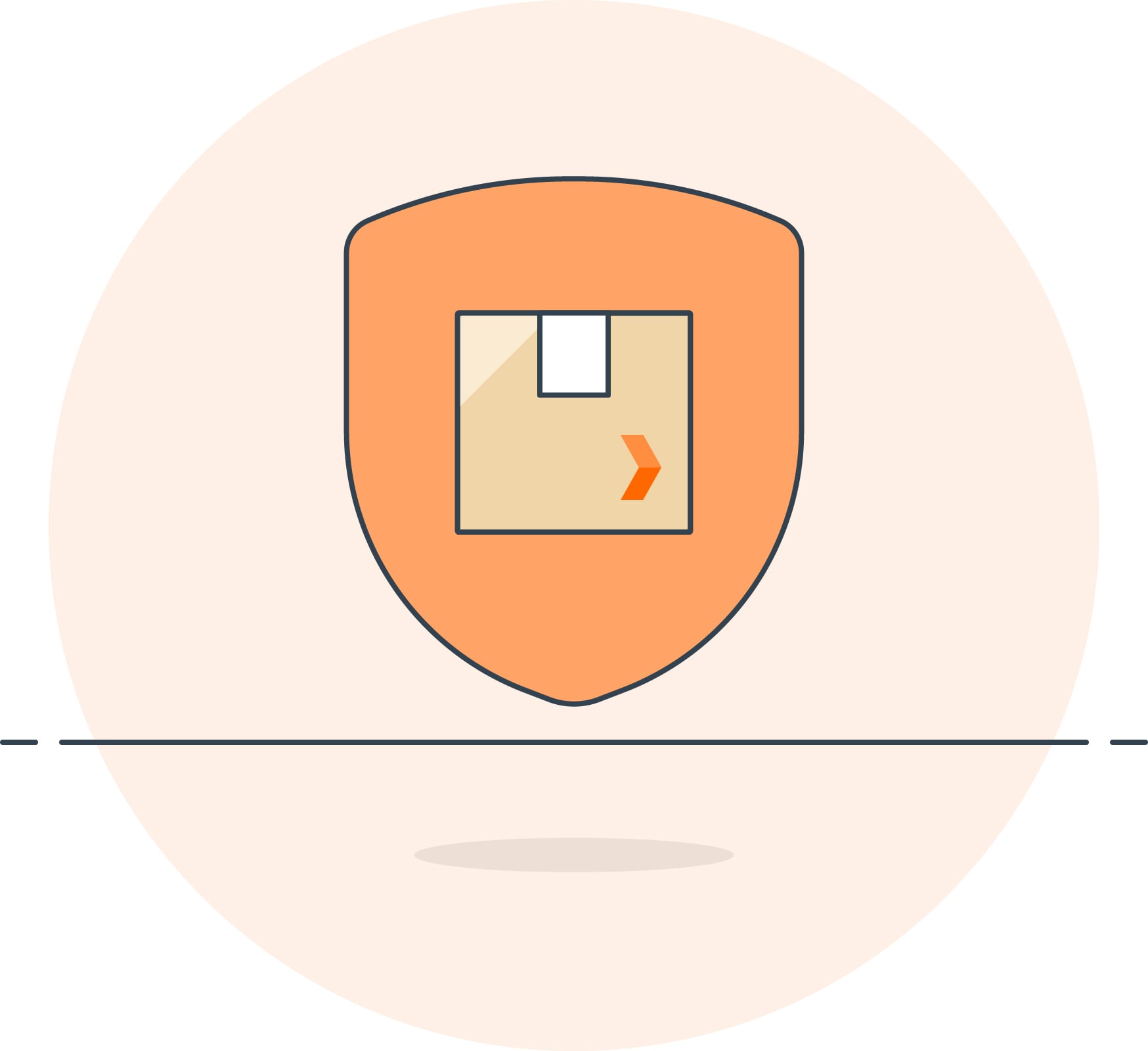
You want to keep your customers informed and safe while they are buying household essentials or indulging in some online retail therapy.
To do that, you can update your communications with helpful instructions for receiving their packages from you.
While experts are saying that the risk of catching COVID-19 from a package is low, customers should still take precautions when receiving a shipment.
If possible, the box should be opened outside and recycled without entering the home. If the item isn’t needed urgently, leave the box out (in a safe place) to wait out the 24 hour lifespan.
Take the merchandise out with freshly washed hands and disinfect on the spot (if possible). For clothing, the easiest thing is to put it straight into the laundry. For items with hard, shiny surfaces, you can use a disinfectant or soap to thoroughly clean it up.
If you need to take the package indoors prior to 24 hours, be sure to have a disinfected landing pad (tabletop, counter, piece of floor) and disinfect anything the box touched inside. Take the merchandise out and disinfect thoroughly (or stick in the wash).
Be cautious and disinfect your cool new thing.
What can shippers do to lessen the chance of spreading COVID-19?
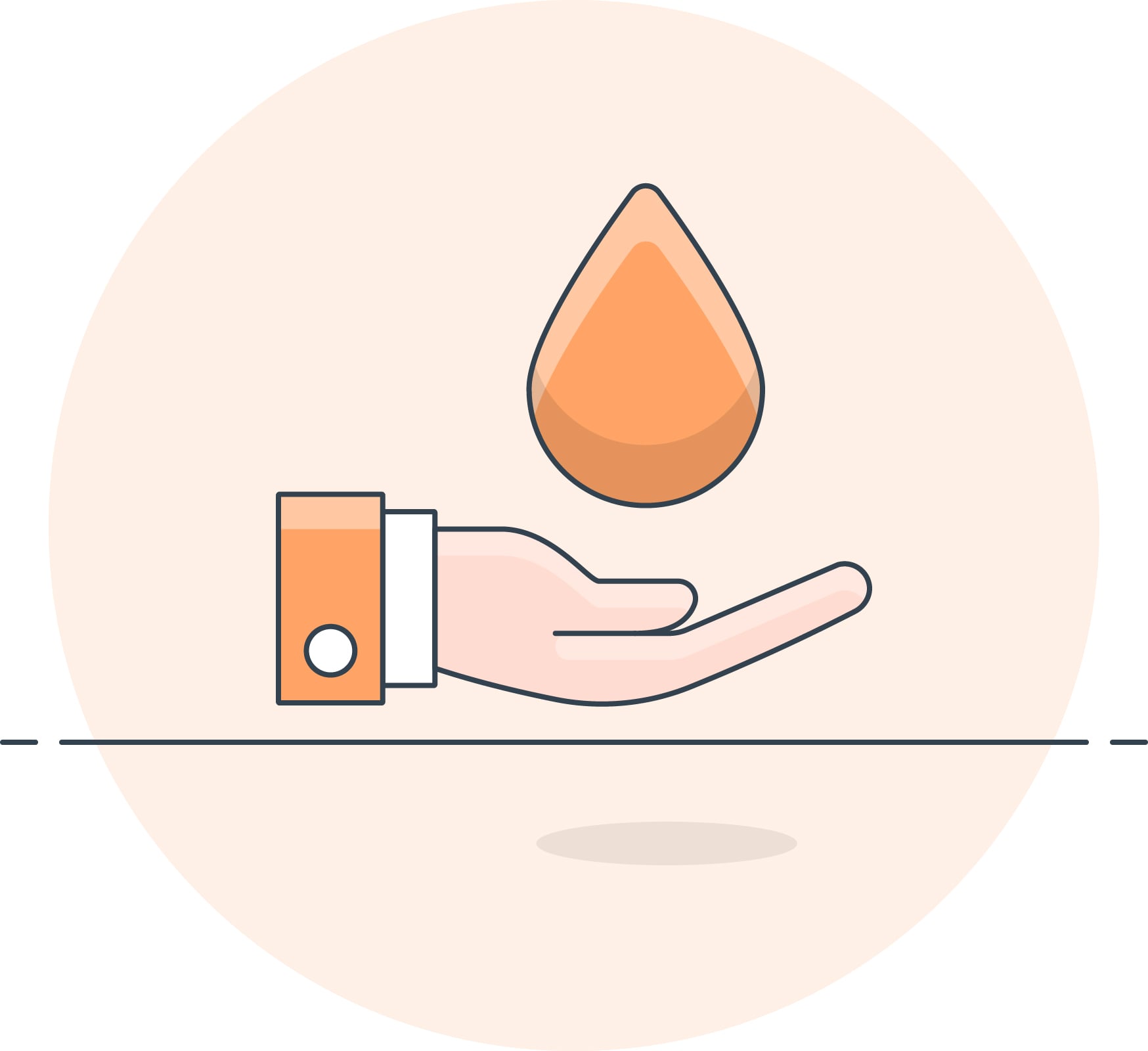
Reassure your customers that you are doing your utmost to keep things clean and virus-free.
Come up with a standardized procedure for your packing operations.
Here are a few guidelines to get you started:
- If any employee is feeling sick (respiratory or otherwise), they should stay home to recuperate.
- Disinfect all products before packing.
- Keep packing stations sanitized regularly.
- Wash hands before packing shipments.
- Use a shipping carrier that practices strict hygienic guidelines.
When you have your company guidelines in place, communicate them to your customers so that they feel comfortable purchasing from you.
Take this opportunity to instruct them on how to keep virus-free when receiving packages.
What are other online retailers doing?
The Source, an LA-based athleisure brand (and Sendle customer), laid out the steps they are taking in a recent blog post.
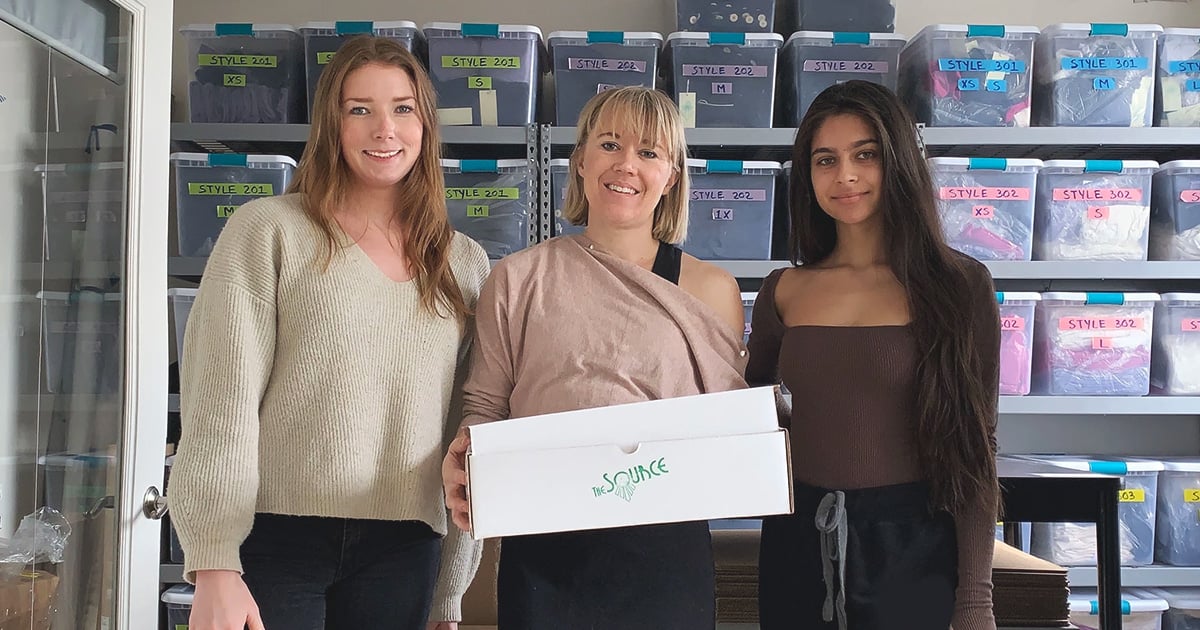
Photo courtesy: The Source
What The Source is Doing About COVID-19
In response to concerns around COVID-19 (a.k.a. Coronavirus), The Source wants to provide customers with accurate information about our product sourcing and handling.
Your health and safety are our number one priority, and we want you to have the ability to make an informed decision about your purchases. Here’s what we’re doing:
-
We have a US-based supply chain. The products we carry at The Source are made by small makers in California.
The sole exception to this is our meditation cushion, which was completed and received in our offices in summer 2019, several months prior to the first COVID-19 case in December 2019.
However, we want you to know that the World Health Organization advises that it is possible to contract the virus from goods manufactured in any country.
-
We have complete control over our inventory and the staff that handles it. We only store our inventory in our offices in downtown Los Angeles, and we fulfill our orders ourselves.
We are a small team and are able to monitor each person closely for any signs of illness. (We’re happy to report that we are all healthy!)
-
The vast majority of our current inventory has been stored securely in our offices since well before the discovery of the first COVID-19 case. The exceptions as of this writing are: the Eucalyptus Shower Steam, the Underarm Detox, the Earl Grey Deodorant, the Luna Charcoal Facial Sponge, the Bamboo Cutlery set, the Verdant Wild Apothecary merchandise, and the Refresh Eye Pillow.
All were manufactured in California in small batches under conditions closely monitored by The Source or our brand partners.
Although coronavirus cannot live long outside of a body and the CDC states that spread of the virus through contact with surfaces and objects is unlikely, we are taking the extra precaution of holding all inventory received after February 1, 2020 in our offices for nine days prior to shipping to customers.
-
We’re being extra cautious about returned inventory. We have very few returns. However, any item that is returned to us will be stored in airtight packaging away from inventory and staff for nine days after receipt.
Additionally, any returned clothing items will be heated in a far infrared sauna at a temperature of 45-55 degrees Celsius for at least 20 minutes prior to being placed back in inventory for order fulfillment.
Temperatures above 40 Celsius help shorten the lifespan of coronaviruses on surfaces. If we receive any returned item for which we are unable to take these measures, we will not resell it.
-
We’re taking hygiene at our offices seriously. We’re being diligent about hand-washing, sanitizing, and staying home should we feel sick. We can’t protect you if we don’t take care of ourselves.
-
We recommend that you wash your hands after opening your package. We want you to know that the World Health Organization advises that the likelihood of contracting COVID-19 from a package is low.
However, just to be safe, we recommend that after opening the envelope or box containing your order, you avoid touching your mouth, nose, eyes, or face until you’ve washed your hands.
If you have any questions or concerns about merchandise or processes at The Source, please don’t hesitate to reach out to us at customers@wethesource.com. We love to hear from you!
Stitch and Scribble, an Australian stationary and hand sewn products store, gave us their system for keeping their goods super clean and virus-free.
- All fabrics are pre-washed with in-wash laundry sanitiser before being dried in the Queensland sunshine.
- We ensure our hands are washed and dried and/or sanitised prior to working with the fabrics.
- Our working surfaces are regularly cleaned down and/ or spritzed with some Glen20 spray.
- If we feel the fabrics or materials we have used to make a product has become compromised in any way, we rewash them or give them a good dose with Glen20 and then air them out in the sunshine again.
- And, of course, we use Sendle for contactless delivery.
Recently, to respond to the needs of the moment, Stitch and Scribble have started making face masks in all sorts of fun patterns and colors.
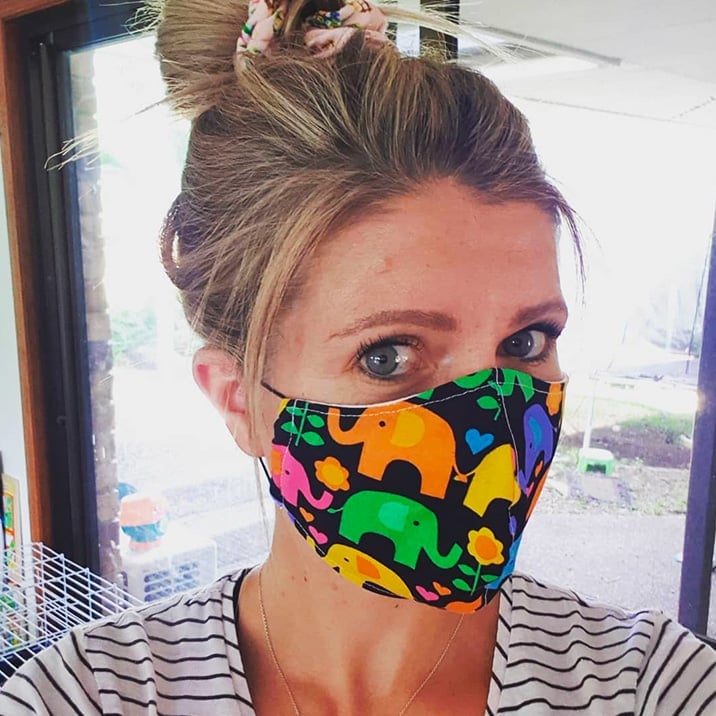
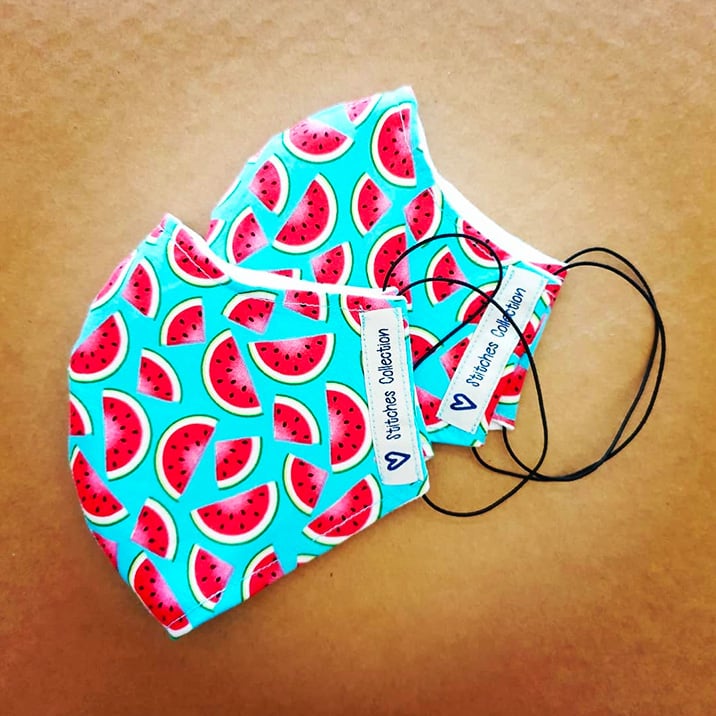
Photo courtesy: Stitch and Scribble
Per their site:
*Please be aware, a material mask is not something medical. It is:
- for improving barrier and lessening hand-mouth contact.
- for avoiding contaminating others with your spit.
- for respecting social distances – if someone sees you with a mask, they may be more inclined to leave more than a metre between them and you.
- not to stop you washing your hands.
As with all masks, the medical advice is to wash your hands before putting them on, not to touch it while on your face, and to wash them after use.
In a recent marketing email, the LA-based ethical footwear store Zuzii described their new packaging process to address COVID concerns.
This is a simple and creative way to manage the crisis while making the customers’ job easy.
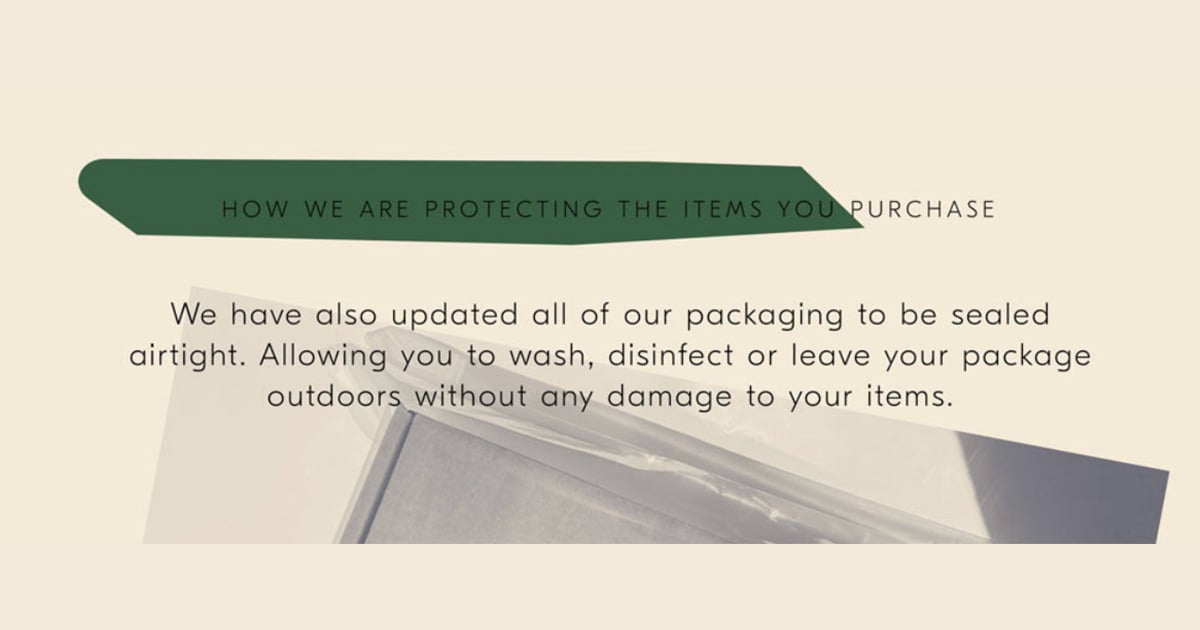
Screenshot from ZUZII
Magpies & Peacocks, a Houston based non-profit design house and Sendle customer, gave us their internal guidelines for keeping things hygienic.
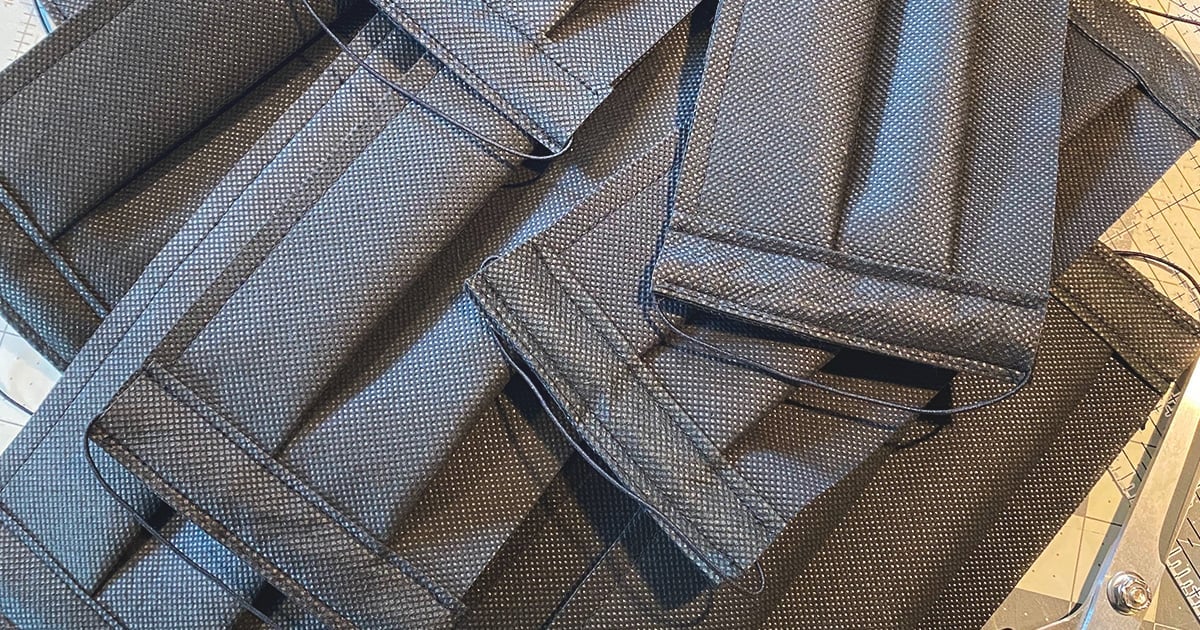
Photo courtesy: Magpies & Peacocks
Our warehouse is closed to the public at this moment and only HEALTHY and not at risk designers and makers are allowed in to pick up sew kits or drop off completed face masks.
The obvious first step is to keep WASHING YOUR HANDS :-) but here are some of the notes we supplied our team:
- First things first M&Ps tribe - keep your sewing station and your hands clean at all times while making.
- Be consistent - if you stop to do something else, start all over again with your cleaning routine to avoid any contamination.
- Do not try on any of the masks, the prototype has been tested for optimum size and fit. You have one sample to handle for reference in your kit. Make yourself one first!
- Pack each finished mask flat and stacked facing the same way in the bags provided as soon as they are completed, and seal to avoid over handling.
In response to the COVID-19 crisis, they’ve stepped up to help provide frontline workers with much needed face masks.
The new normal for eCommerce?
Who we were before the coronavirus outbreak is certainly not who we will be when we reach the other side. And, that’s just fine.
When forced to pivot and get creative with new circumstances, small businesses adapt quickly. It’s an anxious and uncertain time right now. Hopefully, these tips help you keep yourselves and your customers safe.
We will definitely be more hygienic people when this all blows over.

